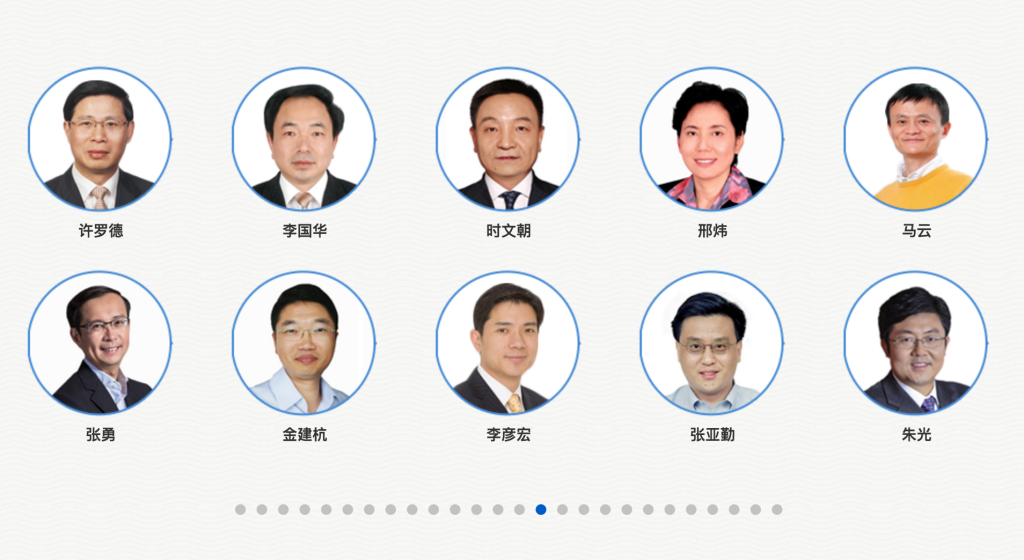- The founders of China’s biggest Internet firms—Baidu, Alibaba, Tencent—were all at the conference
- Netflix CEO Reed Hastings attended from Hollywood

Baidu’s Robin Li (bottom row, center) and Alibaba’s Jack Ma (top row, far right) among the VIP lineup at the World Internet Conference
The World Internet Conference in the east coast city of Wuzhen last week sparked a good deal of debate about the China’s influence on global web governance. In its second year, the conference received a major boost in its significance when President Xi Jinping appeared in person to give a speech on the subject (Last year, he only sent a congratulatory message to mark the event’s opening)
- Read Xi Jinping’s World Internet Conference speech in Chinese, in full, or an edited English version.
While the key points of Xi’s speech focused on security, collaboration, and national sovereignty over Internet affairs, he also made a point of highlighting the role of the web in promoting cultural exchange, enhancing the progress of human civilization, and spreading “positive energy”—the latest catchphrase of Xi’s administration. These points repeated familiar refrains from Xi’s October 2014 speech on arts and culture, which was only released publicly a year after it was delivered, prompting widespread speculation and study.
In Wuzhen, a panel on the role of the Internet in culture fostered some discussion of the interaction between movies and new media in China, emphasizing the role of online marketing in breaking down the barriers between audiences in major metropolises and the moviegoers in the third- and fourth-tier cities who are crucial to reach if China’s film industry hopes to maintain its stellar box office growth. Yet given Chinese entertainment’s shift toward the online realm and Xi’s emphasis on producing wholesome, high-quality content that might perform well both at home and abroad, there were surprisingly few people representing the entertainment industry on the stages of the three-day event. A full list of conference attendees is not readily available, but the conference agenda and VIP guest list provide a good indication of the main areas of focus.
News organizations appeared to be particularly well represented in the speaker lineup, underscoring the important role that information management, or censorship, plays in China’s version of the Internet. More than two dozen Chinese news media executives took to the stage, as did executives from the business side of Bloomberg and Reuters. A familiar refrain repeated by President Xi and Lu Wei, the man Xi appointed China’s Internet czar, is that foreign companies are welcome to participate in China’s Internet boom, as long as they abide by the country’s laws. Hollywood already has strong ties to China’s booming Internet sector, whether through financing and production deals with the fairly new film studios launched by the country’s three Internet giants, Baidu, Alibaba, and Tencent (known collectively as “BAT”), or through licensing deals with their online video platforms, iQiyi (Baidu), Youku Tudou (Alibaba), and Tencent Video. The founders and of all three BAT companies participated in the conference, as did numerous BAT senior executives.
Yet the only significant Hollywood presence seen among the speakers and VIP guests was Netflix CEO Reed Hastings, who has designs on China as a market for his company despite the stacked odds. Perhaps it’s in Hollywood’s best interests to keep such events at arm’s length, given Chinese censors’ apparent need to maintain control of the script for China’s Internet. A cautionary tale: Jimmy Wales, founder of Wikipedia (which is blocked in China), saw his on-stage remarks during a panel on international cultural communications wholly rewritten to conform to Beijing’s official narrative of the event.
Pang-Chieh Ho contributed research.





